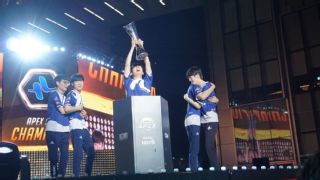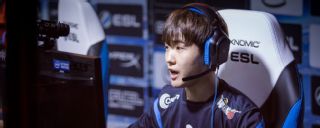|
It was a windy and cold November afternoon when I went to visit Kim "EscA" In-jae at his new home, the KSV PlayerUnknown's Battlegrounds team house. It was on the 29th floor of a luxurious residential tower right outside of Seoul. The building lobby had gleaming marble floors and two winding staircases. EscA greeted me inside when I arrived at the flat. He was wearing an ivory hoodie, grey pants, and a pair of white socks with big smiley faces on them. The hallways were filled with cardboard boxes containing monitors and peripherals; it hadn't been long since they moved in. The team was put together only weeks ago. "Either late October or early November, I can't remember exactly," he said. EscA led me past the spacious living room, where two KSV cameramen were filming a teammate, and into one of the smaller rooms in the far back. With an inviting smile, he rolled me over a gaming chair, plopped down onto another, and calmly waited for the interview to start. This wouldn't be EscA's first interview, or even his hundredth. He has been playing professionally since 2010, when he debuted as a Special Force player for STX SouL, a now-defunct KeSPA organization. Special Force was a team-based FPS -- similar to Counter-Strike, but with some Quake influences -- and EscA mainly played as an entry-fragger. With STX, he won five major tournaments over two years. When Special Force 2 came out in 2011, he transitioned to the sequel and performed even better, winning yet another championship and ascending to legendary status. "Just how good were you at the Special Force series?" I asked. "I guess I did have the best overall career," he answered sheepishly. "But I wouldn't say that I was the ryujehong of Special Force. I'd say I was just below that level." Unfortunately for EscA, as his skill grew, the game's popularity dwindled. At the end of 2012, KeSPA discontinued the Special Force 2 Proleague, and STX disbanded. To continue his playing career, EscA decided to give himself a year to go pro in League of Legends, the hottest new game at the time. Things went well at first. Even though he didn't have a MOBA background, EscA was able to make it to high Challenger without too much trouble. As time went on, however, he started to grow nostalgic for his FPS roots. He also wasn't sure if League was a title in which he could become one of the game's best. At that time, salaries weren't high in Korean League of Legends -- the scene was nowhere near as big or as glamorous as it is today -- so EscA couldn't see the point in continuing to pursue a career path that didn't suit him all that well. He chose to quit League and return to the FPS genre. The title he transitioned to was Black Squad. Under the Lunatic-Hai banner, he competed in Seasons 1 through 3 of Black Squad Night, South Korea's premier league for the game. They won all three seasons in dominant fashion. "In Black Squad, I was the game's ryujehong," EscA said, beaming proudly. "I was the best. Other teams would always taunt our team in interviews by saying that they'd be nothing without me." EscA explained that the slow pace of the game fit him well. Black Squad has far less hyper-FPS elements compared to the Special Force series. This gave him more time to think about what plays he could make, which complemented his primary strengths as a player: intelligence and creativity.  When EscA first started playing Overwatch, he'd just moved over from Black Squad. He was considered a mechanically outstanding player. For instance, he was acknowledged as one of South Korea's Top 3 McCrees. But by the start of his second professional season, his physical edge began to taper off. To account for it, he reinvented himself to play a more cerebral, team-oriented style, revolving around outfoxing, rather than outdueling his opponents. This change was not well-received, as such styles are more difficult to appreciate. But his way of bypassing his limitations was undeniably effective, and he reaped massive competitive success with the approach until his retirement from the game. Less informed Overwatch fans may be quick to brush off EscA as a meme, a joke of a DPS, best known for whiffing Pulse Bombs. Those who have long kept an eye on APEX, however, will remember his recurring brilliance on off-kilter playmakers. It's not a coincidence that EscA's best heroes in Overwatch were Mei and Sombra -- two picks that allow for maximum creative freedom while being mechanically undemanding. On those characters, he could easily offset his lack of physicality through ingenious play. In an ideal world, EscA would've just kept up mechanically with the many new talents that surpassed him every day. But few players in any esport can remain capable of competing toe-to-toe against prodigies 10 years younger than them. In Korean Overwatch, Ryu "ryujehong" Je-hong might be the only example. And not everyone can be ryujehong. "I really did try to learn heroes like Genji," EscA said, "but it felt like there was a wall. They say that you have to be young to play Genji well, and maybe for me it had some truth. But I should've tried to pick up at least the other projectile heroes. I still have a lot of regret about not having practiced them enough." Never having shot projectiles before coming to Overwatch, EscA failed to attain tournament proficiency on most heroes up until his retirement from the game. In his defense, that didn't really matter for a long time; Lunatic-Hai was capable of winning championships without him ever needing to pick one. But eventually, both the meta and the competition came to a point where his narrow hero pool became a liability. It was the beginning of the end of his Overwatch career. In retrospect, perhaps he should have tried to overcome his limitations, not transcend them. "I guess I can't guarantee that I would have," he said. "But I think I could have."
EscA was supposed to go to the Overwatch League. He was one of Seoul Dynasty's first six signings. Even though his form had dipped in recent months, the team considered him a vital member unwaveringly. "When EscA's in the booth, the whole team changes," Dynasty head coach Baek Kwang-jin had told me. "The trust between him and the other players is truly palpable. I really wanted him to come with us." But for EscA, the decision wasn't simple. At 26, he has only two years left to play professionally before he must leave for his mandatory military service. If he left for the league, Overwatch would be the last game of his playing career. He wasn't sure if that was what he wanted. "I wanted one last challenge," he said. "And I thought that challenge would be going to the Overwatch League and proving myself as a top player again. But then Battlegrounds started gaining huge traction, and I realized that it had enough potential to become an even bigger stage than the Overwatch League, even if that's not the case right now." The Overwatch League's promise of premier international competition was alluring, but for EscA, the challenge itself wasn't something entirely new. He had already competed and won in international tournaments numerous times over his decorated career, after all -- both of his APEX wins and his World Cup victory involved taking down top foreign teams. Did he really need to repeat his accomplishments? On the other hand, Battlegrounds presented a chance for EscA to showcase his talents in yet another FPS subgenre: battle royale. It would be more difficult, but it would be more rewarding. And if he were to claim a big tournament victory in PUBG as well, he would have proven himself as a world class player in five different FPS titles. It seemed like a nice round number to end his career on. "I've always felt a bit stressed playing Overwatch," he said. "Even though I kept soldiering through, it never felt like it was the right game for me." Playing alongside Lee "LEETAEJUN" Tae-jun, who has been EscA's teammate in every title since Special Force 2, will surely be comforting. While EscA was unclear what his style of play in the new game would be, he guessed that his tendencies to think outside the box and make unpredictable maneuvers would again manifest. "I'm still the same person, right? Only the game is different." He smiled. "I'm still the same player."
|

